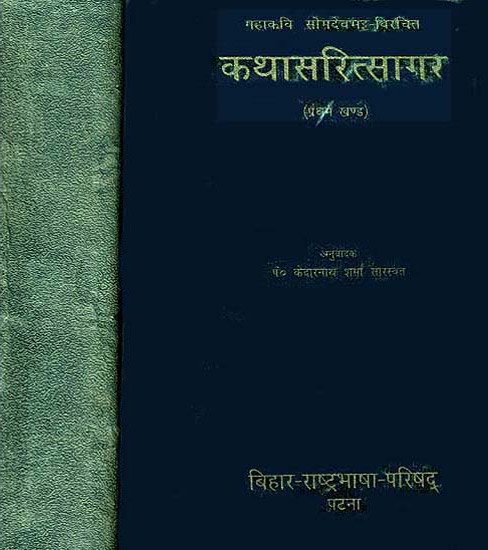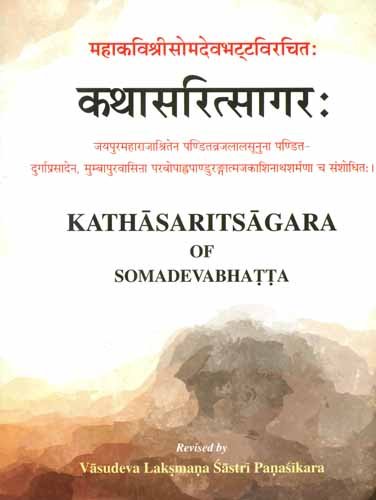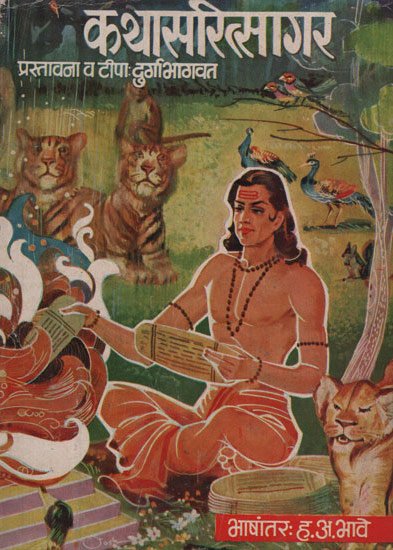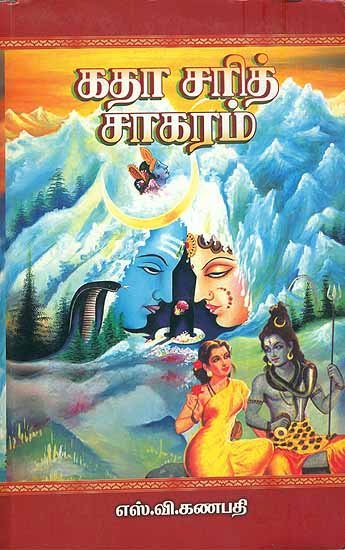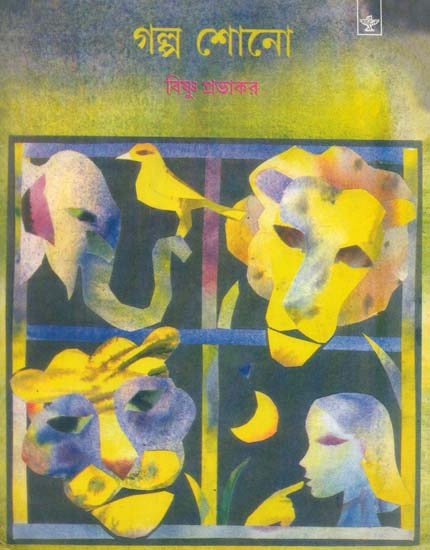Kathasaritsagara [sanskrit]
by C. H. Tawney | 2014 | 226,424 words | ISBN-13: 9789350501351
The Sanskrit edition of the Kathasaritsagara referencing the English translation and grammatical analysis. Written by Somadeva and dating from the 12th century, the Kathasaritsagara (or Katha-sarit-sagara) represents an epic legend narrating the adventures of Naravahanadatta as he strives to become the destined emperor of the Vidyadharas. Alternative titles: (Kathāsaritsāgara, कथासरित्सागर, Kathā-sarit-sāgara)
Verse 12.2.112
गच्छन् क्रमाच् च संप्राप्य पश्चिमाब्धेस् तटं पुनः ।
कथं तरेयम् अम्भोधिम् इति तत्र व्यचिन्तयत् ॥ ११२ ॥
gacchan kramāc ca saṃprāpya paścimābdhes taṭaṃ punaḥ |
kathaṃ tareyam ambhodhim iti tatra vyacintayat || 112 ||
The English translation of Kathasaritsagara Verse 12.2.112 is contained in the book The Ocean of Story by C.H. Tawney. This book is available online or you could buy the latest edition:
Read online Buy now! The English translation by C.H. Tawney (2014)
Glossary of Sanskrit terms
Note: This extracts Sanskrit terms and links to English definitions from the glossary, based on an experimental segmentation of verse (12.2.112). Some terms could be superfluous while some might not be mentioned. Click on the word to show English definitions.
Gacchat, Kramat, Krama, Samprapya, Pashcima, Abdhi, Tata, Puna, Katham, Katha, Ambhodhi, Iti, Tatra, Vya,
Analysis of Sanskrit grammar
Note: this is an experimental feature and only shows the first possible analysis of the Sanskrit text (Kathasaritsagara Verse 12.2.112). If the system was successful in segmenting the sentence, you will see of which words it is made up of, generally consisting of Nouns, Pronouns, Verbs, Participles and Indeclinables. Click on the link to show all possible derivations of the word.
- Line 1: “gacchan kramāc ca saṃprāpya paścimābdhes taṭaṃ punaḥ ”
- gacchan -
-
gacchat (noun, masculine)[nominative single], [vocative single]
- kramāc -
-
kramāt (indeclinable)[indeclinable]krama (noun, masculine)[adverb], [ablative single]
- ca -
-
ca (indeclinable conjunction)[indeclinable conjunction]ca (noun, masculine)[compound], [vocative single]ca (noun, neuter)[compound], [vocative single]
- samprāpya -
-
samprāpya (noun, masculine)[compound], [vocative single]samprāpya (noun, neuter)[compound], [vocative single]
- paścimā -
-
paścima (noun, neuter)[compound], [vocative single]paścima (noun, masculine)[vocative single]paścimā (noun, feminine)[nominative single]
- abdhes -
-
abdhi (noun, masculine)[ablative single], [genitive single]
- taṭam -
-
taṭa (noun, masculine)[adverb], [accusative single]
- punaḥ -
-
pu (noun, neuter)[ablative single], [genitive single]puna (noun, masculine)[nominative single]pū (noun, neuter)[ablative single], [genitive single]
- Line 2: “kathaṃ tareyam ambhodhim iti tatra vyacintayat ”
- katham -
-
katham (indeclinable interrogative)[indeclinable interrogative]katham (indeclinable)[indeclinable]kathā (noun, feminine)[adverb]katha (noun, masculine)[adverb], [accusative single]katha (noun, neuter)[adverb], [nominative single], [accusative single]
- tareyam -
-
√tṝ (verb class 1)[optative active first single]
- ambhodhim -
-
ambhodhi (noun, masculine)[accusative single]
- iti -
-
iti (indeclinable particle)[indeclinable particle]iti (noun, feminine)[compound], [adverb]
- tatra -
-
tatra (indeclinable adverb)[indeclinable adverb]tatra (indeclinable correlative)[indeclinable correlative]tatra (indeclinable)[indeclinable]
- vya -
-
vi (indeclinable adverb)[indeclinable adverb]vi (indeclinable preposition)[indeclinable preposition]vi (noun, masculine)[compound], [adverb], [nominative dual], [vocative dual], [accusative dual]vi (noun, neuter)[compound], [adverb], [nominative single], [vocative single], [accusative single]ve (noun, masculine)[adverb]vya (noun, masculine)[compound], [vocative single]vī (noun, feminine)[compound], [adverb]vī (noun, masculine)[compound], [adverb]vī (noun, neuter)[compound], [adverb], [nominative single], [vocative single], [accusative single]vi (Preverb)[Preverb]
- acintayat -
-
√cint (verb class 10)[imperfect active third single]
Other editions:
Also see the following editions of the Sanskrit text or (alternative) English translations of the Kathasaritsagara Verse 12.2.112
Kathasaritsagar
by Kedarnath Sharma Saraswat (2005)
The Only Edition with the Sanskrit Text and its Hindi Translation (An Old and Rare Book) Set of 3 Vol.
Buy now!
Kathasaritsagara of Somadeva Bhatta (Sanskrit Text Only)
by Vasudeva Laksmana Sastri (2013)
Katha Sarit Sagar in Marathi
by H. A Bhave (1995)
Set of 5 Volumes; Published by Varada Books, Pune. 2256 pages (Throughout B/W Illustrations).
Buy now!
Katha Sarit Sagara (Tamil)
by S. V. Ganapati (எஸ். வி. கணபதி) (2014)
[கதா சரித் சாகரம்] Published by Alliance Publications.
Buy now!
Galpa Shono
by Abhijit Chattopadhyay (2014)
[গল্প শোনো] Galpa Shono: Bengali Translation of 'Suno Kahani From Katha Sarit Sagar'; 9788126015436; Published by Sahitya Akademi, Delhi.
Buy now!Preview of verse 12.2.112 in Bengali sript:
গচ্ছন্ ক্রমাচ্ চ সংপ্রাপ্য পশ্চিমাব্ধেস্ তটং পুনঃ ।
কথং তরেযম্ অম্ভোধিম্ ইতি তত্র ব্যচিন্তযত্ ॥ ১১২ ॥
![Kathasaritsagara [sanskrit] - book cover](/uploads/a/Katha-Sarit-Sagara.jpg)
